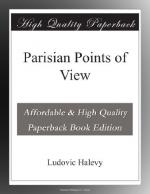Obviously M. Halevy is fond of the actors and the actresses with whom he spent the years of his manhood. They appear again and again in his tales; and in his treatment of them there is never anything ungentlemanly as there was in M. Jean Richepin’s recent volume of theatrical sketches. M. Halevy’s liking for the men and women of the stage is deep; and wide is his knowledge of their changing moods. The young Criquette and the old Karikari and the aged Dancing-master—he knows them all thoroughly, and he likes them heartily, and he sympathizes with them cordially. Indeed, nowhere can one find more kindly portraits of the kindly player-folk than in the writings of this half-author of “Froufrou”; it is as though the successful dramatist felt ever grateful towards the partners of his toil, the companions of his struggles. He is not blind to their manifold weaknesses, nor is he the dupe of their easy emotionalism, but he is tolerant of their failings, and towards them, at least, his irony is never mordant.
Irony is one of M. Halevy’s chief characteristics, perhaps the chiefest. It is gentle when he deals with the people of the stage—far gentler then than when he is dealing with the people of Society, with fashionable folk, with the aristocracy of wealth. When he is telling us of the young loves of millionaires and of million-heiresses, his touch may seem caressing, but for all its softness the velvet paw has claws none the less. It is amusing to note how often M. Halevy has chosen to tell the tale of love among the very rich. The heroine of The Abbe Constantin is immensely wealthy, as we all know, and immensely wealthy are the heroines of Princesse, of A Grand Marriage, and of In the Express.[A] Sometimes the heroes and the heroines are not only immensely wealthy, they are also of the loftiest birth; such, for instance, are the young couple whose acquaintance we make in the pages of Only a Waltz.
[Footnote A: Perhaps the present writer will be forgiven if he wishes to record here that In the Express (Par le Rapide) was published in Paris only towards the end of 1892, while a tale not wholly unlike it, In the Vestibule Limited, was published in New York in the spring of 1891.]
There is no trace or taint of snobbery in M. Halevy’s treatment of all this magnificence; there is none of the vulgarity which marks the pages of Lothair, for example; there is no mean admiration of mean things. There is, on the other hand, no bitterness of scourging satire. He lets us see that all this luxury is a little cloying and perhaps not a little enervating. He suggests (although he takes care never to say it) that perhaps wealth and birth are not really the best the world can offer. The amiable egotism of the hero of In the Express, and the not unkindly selfishness of the heroine of that most Parisian love-story, are set before us without insistence, it is true, but with an irony so keen that even he who runs as he reads may not mistake the author’s real opinion of the characters he has evoked.




